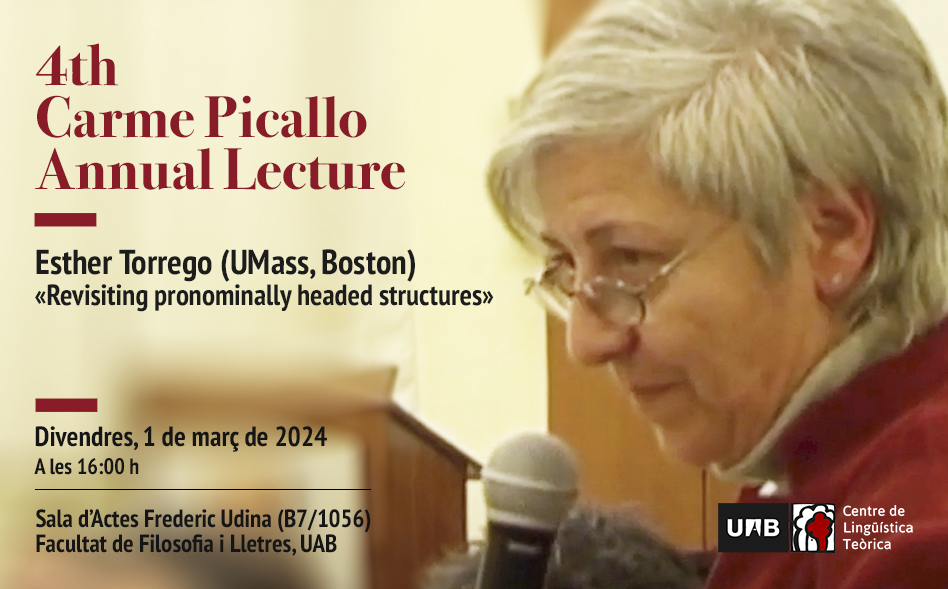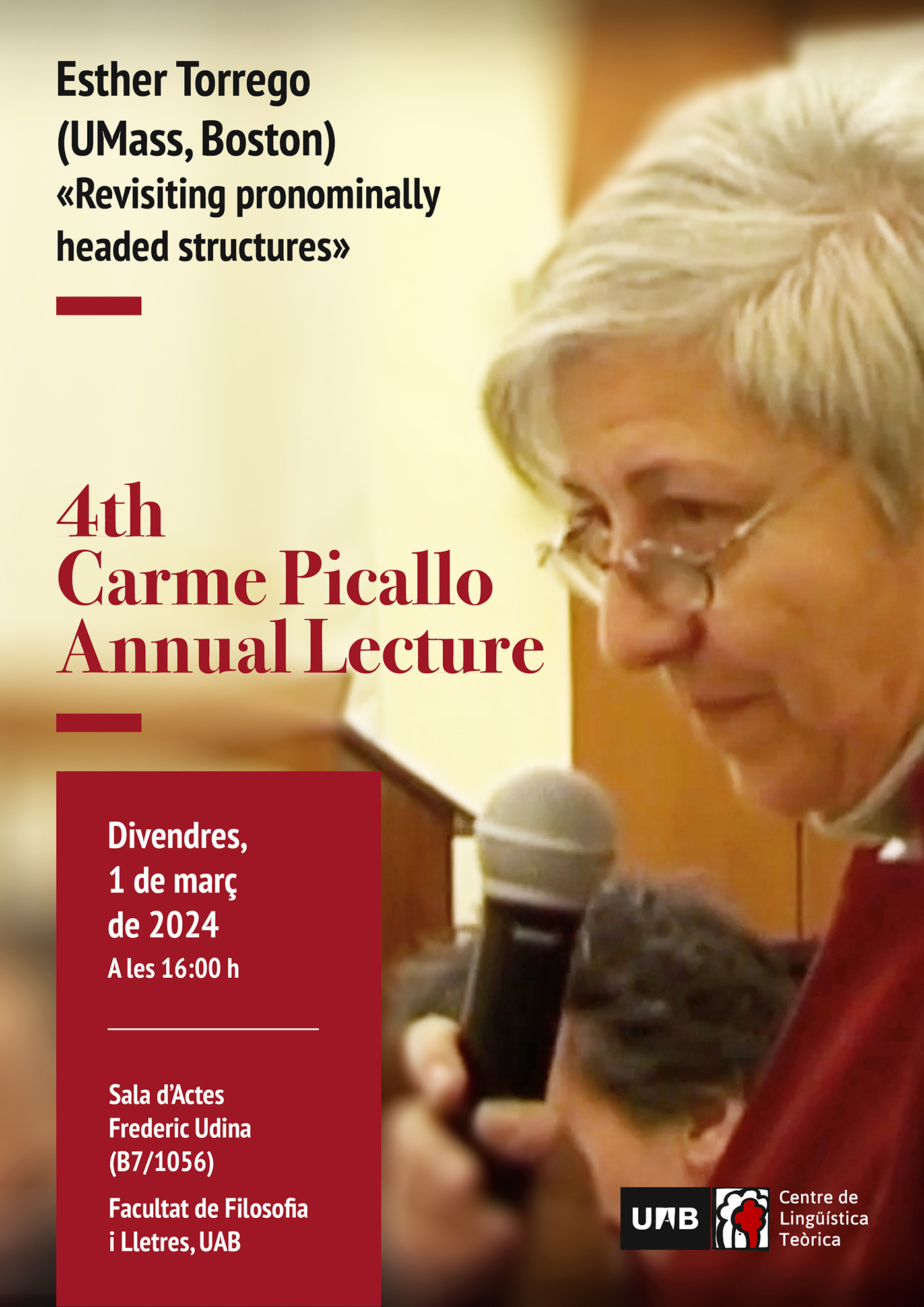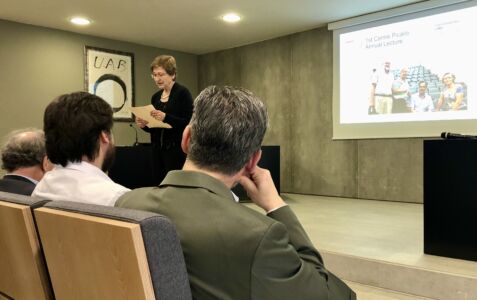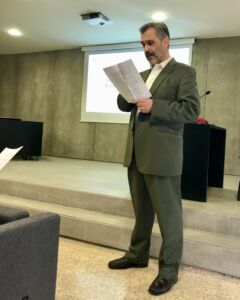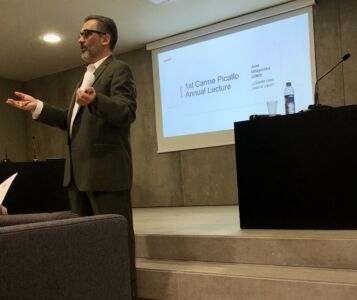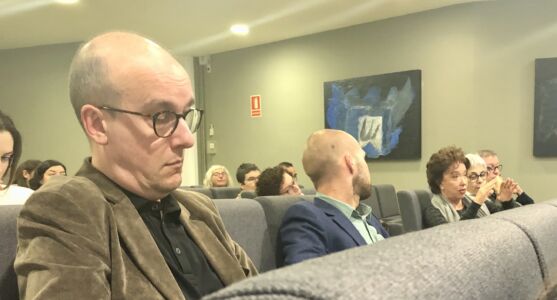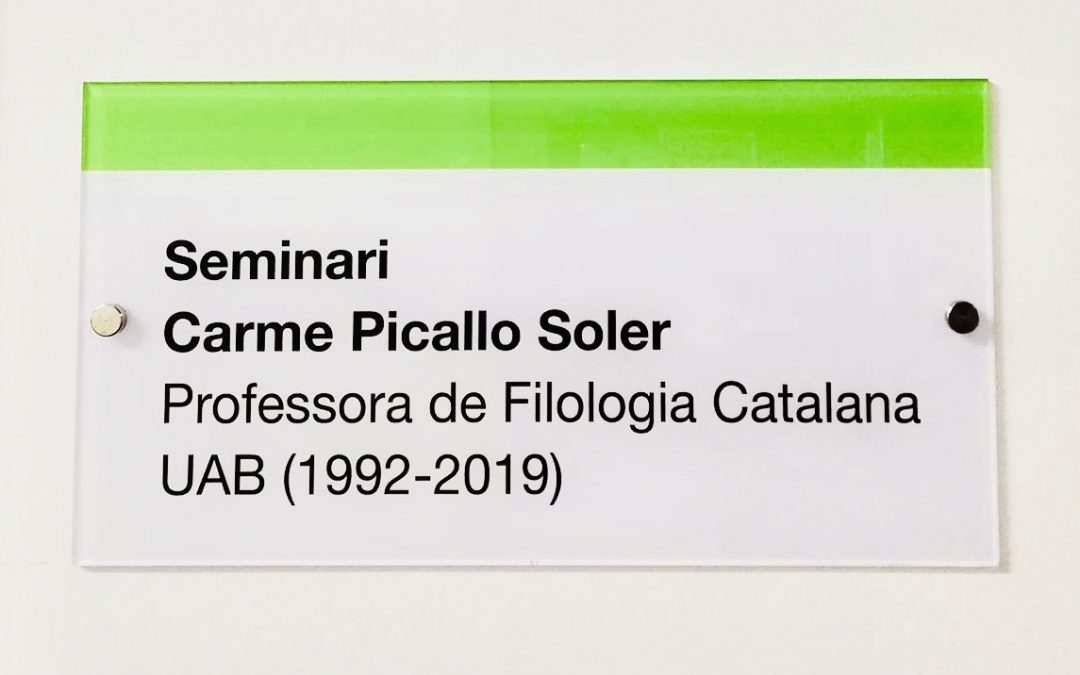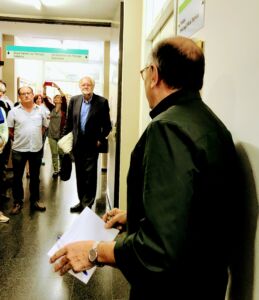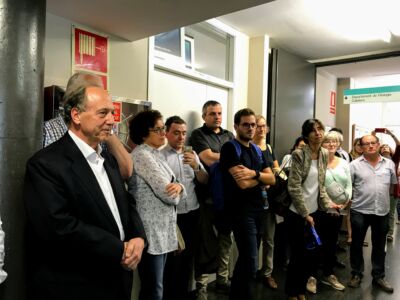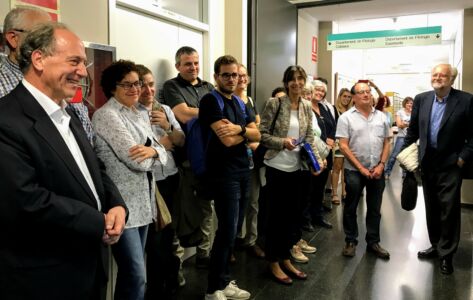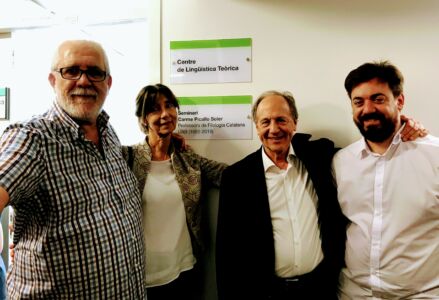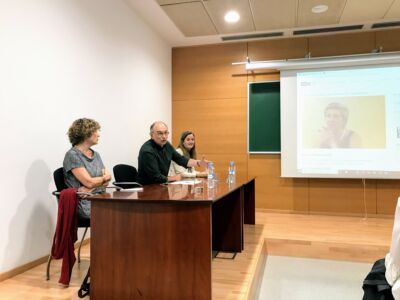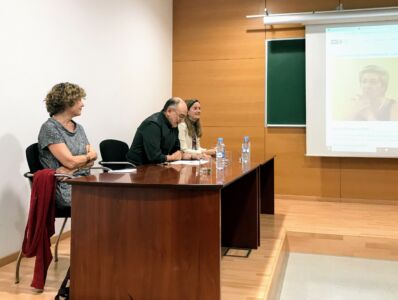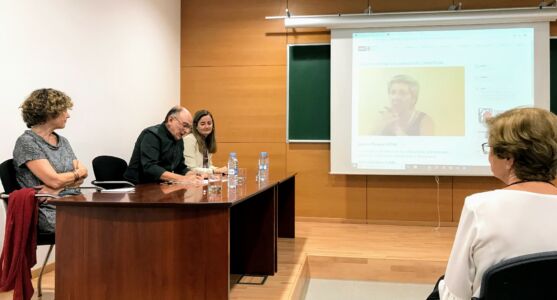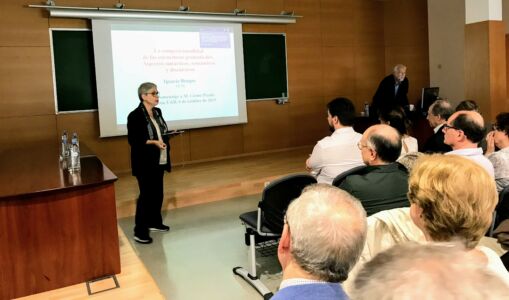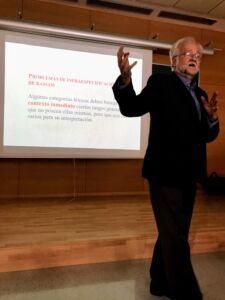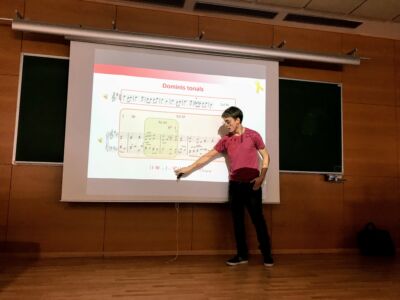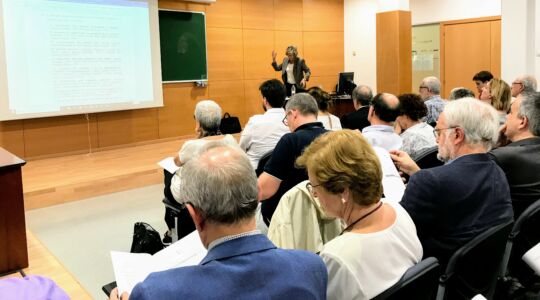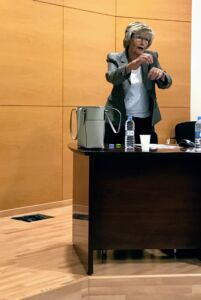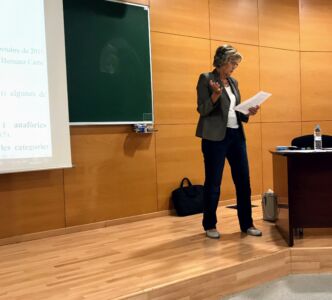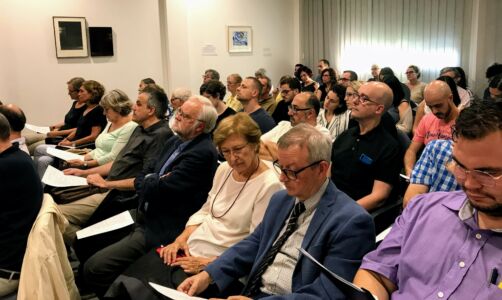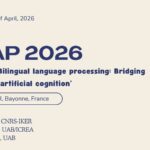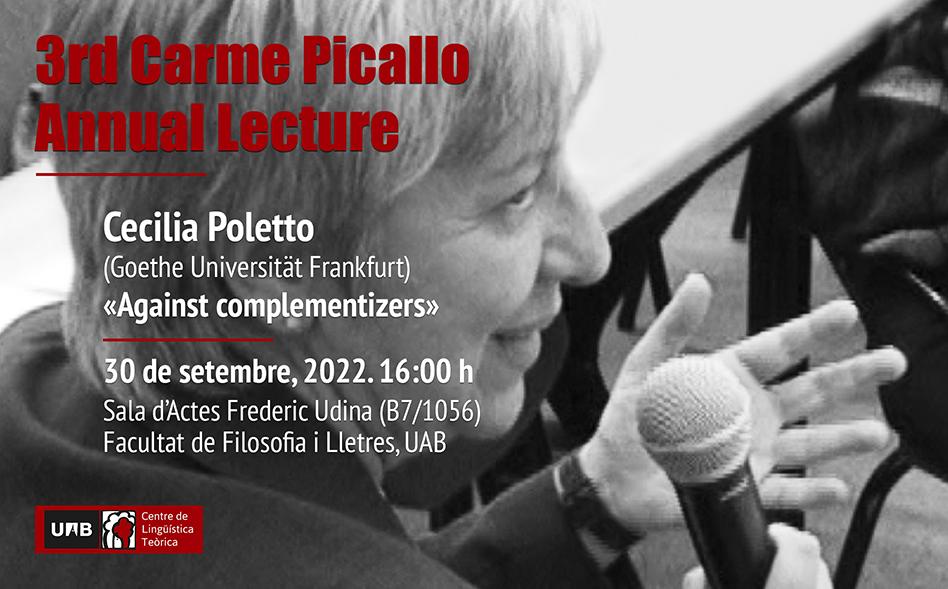
1 setembre, 2022
El Centre de Lingüística Teòrica de la UAB dedica una conferència anual de lingüística teòrica a la memòria de la Dra. Carme Picallo.
Aquestes “Conferències en memòria de Carme Picallo / Carme Picallo Annual Lectures“, dictades per lingüistes de prestigi reconegut, ens permeten homenatjar la nostra col·lega i amiga, i enfortir les relacions internacionals.
En aquesta tercera edició, la conferencia Against complementizers anirà a càrrec de la Dra. Cecilia Poletto de la University of Padua i la Goethe Universität Frankfurt.
Cecilia Poletto (University of Padua and Goethe Universität Frankfurt)
«Against complementizers»
(Joint work with Emanuela Sanfelici)
30 de setembre, 2022. 16:00h
Sala d’Actes Frederic Udina (B7/1056)
Facultat de Filosofia i Lletres, UAB
Emissió per Teams
In this programmatic talk, I intend to explore the possibility that the way we conceive complementation in Romance and Germanic has to be entirely rethought. The basic proposal is that what we call ‘complementizer’ and place in the head of C° is actually not a complementizer but a sort of determiner-like category which is also found in relative clauses, as proposed in Manzini and Savoia (2003, 2011) and Kayne (2010a). However, unlike the previous accounts, I propose that as in relative clauses the ‘complementizer’ partially spells out either the nominal element internal to the relative/complement clause or the external nominal modified by the relative/complement clause itself. The different position of the ‘complementizer’ derives the well-known presence and lack of asymmetries in word orders between main and subordinate clauses in respectively German and Italian. In addition, I propose a solution for the difference in terms of extraction from relative and complement clauses, which has remained up to now unaddressed, and thus problematic, in the previous accounts that equate complement to relative clauses. The empirical testing ground is mainly limited to a selection of Romance and Germanic languages, namely Italian, Italian varieties, English, and German. The idea that complementizers are not merged in a C° position is actually not new: Leu (2015b) has proposed that Germanic complementizers are merged inside the relative/complement clause and then moved to the left periphery in the light of Kayne’s (2010a) intuition that all embedded clauses are in reality relative clauses. Maintaining the general setting of this framework, i.e. that embedded clauses are all relative clauses as already put forth by Kayne (2010a) for complement clauses and by Haegeman (2003, 2006, 2010) for some kinds of adjunct clauses (like temporal clauses), I will not take Kayne’s raising analysis but rather capitalize on the analysis of relative clauses originally proposed in Cinque (2013). In this approach, relative clauses are treated as a special type of adjectives, which are thus merged in the same domain in which adjectives are. Therefore, relative clauses modify a nominal expression. In addition, relative clauses contain another nominal expression, which is the relativized phrase and is non-distinct from the nominal expression modified by the relative clause itself. Hence, two nominal expressions are involved in Cinque’s derivation (see already Sauerland 2003): one internal to the relative clause and one external to it and modified by the relative clause itself. In other words, all relative clauses amount to correlative structures where one of the two correlative nominal expressions remains unpronounced, at least in languages like German and Italian.On this basis, I propose that complementizers in modern Romance are different from those in some Germanic languages because they realize (part of) the external head, i.e. the object of the main clause, and are therefore to be conceived as part of the main clause, and not of the embedded clause. I will also discuss a number of arguments that show that what we call “complementizer” occurs in nominal domains that are not expected if this were a C° head.

2 febrer, 2022
El Centre de Lingüística Teòrica de la UAB dedicarà una conferència anual de lingüística teòrica a la memòria de la Dra. Carme Picallo. Les “Conferències en memòria de Carme Picallo / Carme Picallo Annual Lectures“, dictades per un lingüista de prestigi reconegut, ens permetran homenatjar la nostra col·lega i amiga, i enfortir les relacions internacionals.
Antonio Fábregas (University of Tromsø)
Gender marking is syntactic: agreement, alternations, appreciative morphology
Data: 25 de febrer del 2022
Hora: 15:30
Lloc: Aula 402
Facultat de Filosofia i Lletres
Emissió per TEAMS
Gender marking is syntactic: agreement, alternations, appreciative morphology
Antonio Fábregas
University of Tromsø-Norway’s Arctic University
antonio.fabregas@uit.no
The nature of gender, as opposed to number or tense, is particularly controversial in the debate about the autonomy of morphology, and has been a particularly problematic category to analyse in models where syntax accounts for word formation. Gender is in principle special because (i) not all languages use this category on the surface (ii) when present, gender has what seems to be both inflectional properties and properties expected of morphological derivational processes and (iii) gender seems to produce a chaotic pattern of data. The goal of this talk is to show, starting from ideas originally formulated in Picallo (2008, 2017), that gender displays the behaviour expected of a syntactically active category, contra approaches which treat it as an at least partially morphological or lexical property, such as Harris (1991). What makes gender special is that the surface representation involves exponents that cross two distinct syntactic areas, one assimilated to classifiers and one assimilated to nominal phi features. Empirically, in this talk we will argue for this approach based on three families of facts:
a) So-called appreciative suffixes fall into three classes with respect to their gender behaviour: (i) suffixes that alter the gender value and the morphological marking of gender (1), (ii) suffixes that alter the morphological marking of gender but preserve its gender value (2), (iii) suffixes that preserve gender and can also preserve the gender marking of the noun (3). This is what we expect if gender involves two distinct areas, so that additional syntactic constituents can be introduced at different heights within these areas.
(1) la piba ‘girl’ > el pib-ón ‘the pretty girl’
(2) el problema ‘the problem’ > el problem-az-o ‘the big problem’
(3) el problema ‘the problem’ > el problem-it-a ‘the small problem’
b) Languages can actively add heads within the classifier area, without manipulating the internal structure of the phi feature area, as witnessed by the grammatical behaviour of so-called ‘inclusive gender’ (4)
(4) les chiques ‘the young people’ > les chiqu-it-es ‘the nice / small young people’
c) The difficulty of having gender mismatches in ellipsis (5a) in contrast to number mismatches (5b) rather than denying the syntactic status of gender confirms it, as noun classifiers are syntactically low and contained in the domain of material involved in ellipsis, which forces gender phi features to be identical across the two NPs.
(5) a. *el hijo de Juan y la e de Pedro
the son of Juan and the of Pedro
Intended: ‘Juan’s son and Pedro’s daughter’
b. el hijo de Juan y los e de Pedro
the son of Juan and the of Pedro
‘Juan’s son and Pedro’s son
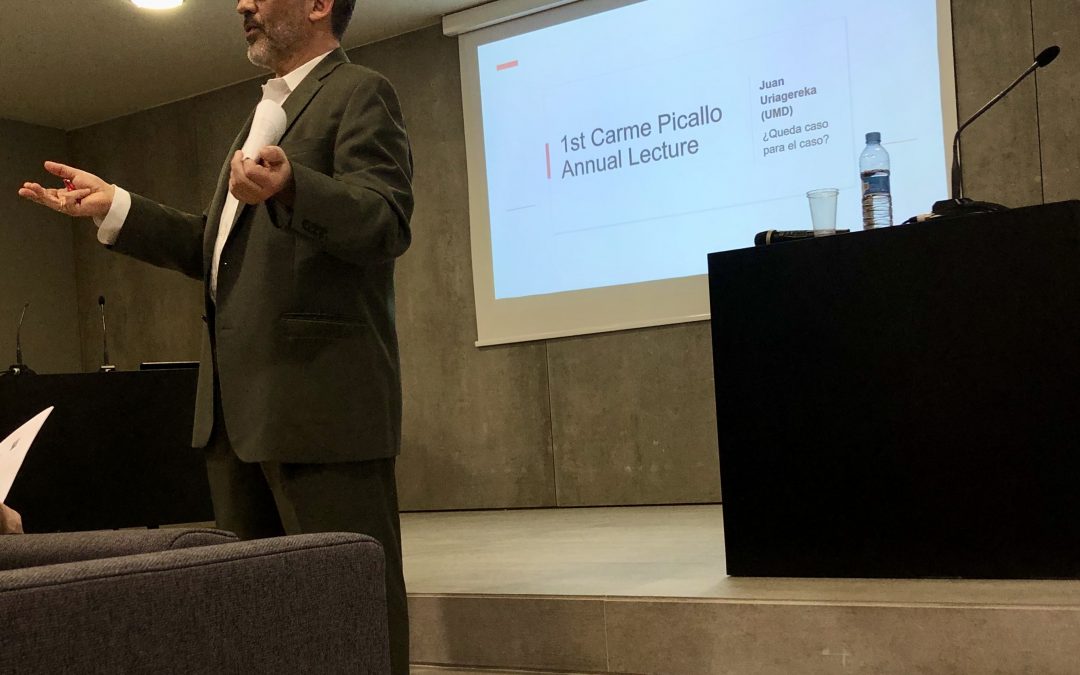
17 desembre, 2019
El Centre de Lingüística Teòrica de la UAB dedicarà una conferència anual de lingüística teòrica a la memòria de la Dra. Carme Picallo. Les “Conferències en memòria de Carme Picallo / Carme Picallo Annual Lectures“, dictades per un lingüista de prestigi reconegut, ens permetran homenatjar la nostra col·lega i amiga, i enfortir les relacions internacionals.
1st Carme Picallo Annual Lecture
Juan Uriagereka (University of Maryland)
¿Queda caso para el caso?
Data: 24 de gener del 2020
Hora: 16:00
Lloc: Sala de Graus
Facultat de Filosofia i Lletres
